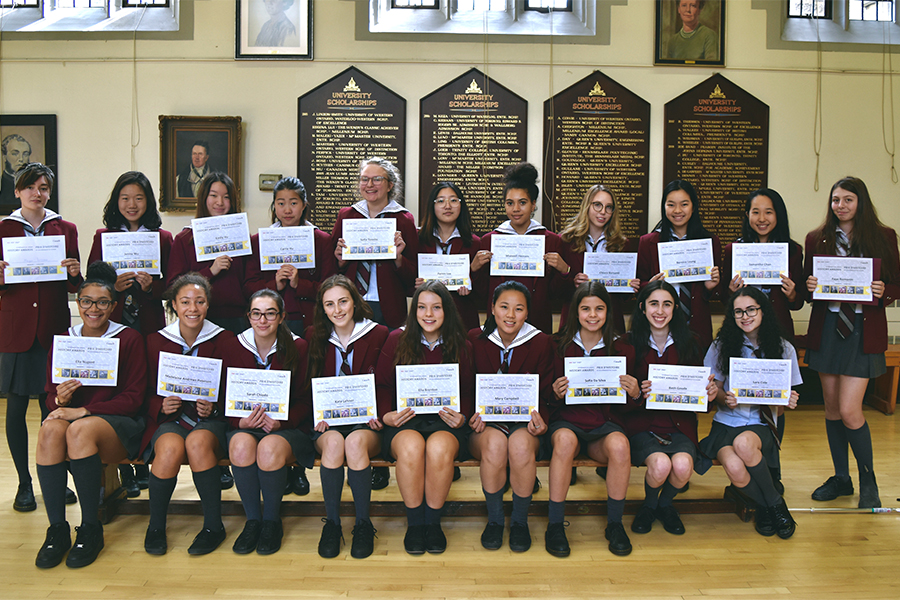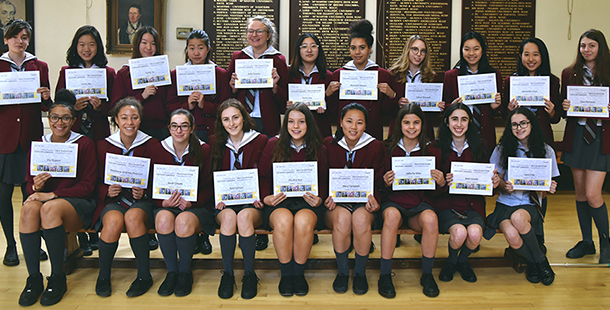Grade 10 class wins awards for their essays key moments like WWI and Expo ’67

A CLASS OF THEIR OWN: A total of 23 Grade 10 students at Bishop Strachan School won awards for their essays on Canadian history.
The Bishop Strachan School has made a little bit of history as 23 of its students won essay accolades at Government of Canada History Awards in late March.
Created in 2013, the Government of Canada History Awards applaud the work of university and secondary school students who show a great interest in historical moments in Canada.
Each student received $1,000 as part of the award. They were required to submit 1,000-word essays on reconciliation with indigenous peoples, the First World War, Expo ’67, Canadian identity or the development of a new national historic site. Within that essay, students had to demonstrate original research, historical analysis, good knowledge of the subject matter, and critical thinking.
Helming the team of Grade 10 students, along with fellow teachers James Stewart and Erica Brocco, was BSS Head of the Humanities and Social Sciences Department, Rita Gravina. She said it was an excellent opportunity to see that history is a discipline that provides insight into how Canada has evolved.
“The essays they wrote required them to delve into their own identities and to see how different historical moments influenced who they are,” Gravina said. “This was not only rewarding to them, but it also allowed them to reflect on their understanding of themselves and the part they play in the fabric of our nation as we move forward in Canada’s future.”
The greatest challenge, however, was hitting the books, rather than surfing the information highway.
With the internet providing a substantial amount of misinformation, being able to form a sound argument and to be able to support their arguments with strong, factual evidence was important.
“This is what makes for good historical research,” Gravina said. “Balancing secondary evidence with first-hand primary evidence was also a challenge.”
Topics included “The Shadow of Racism in Canadian History” as written by Ella Nugent, who said on the government website, “It is important to shine a light on the shadows in every nation’s history, as it helps make sense of why we are the way we are today”.
Faye Romanin chose to write about Italian internment camps during the Second World War because it was something that affected her family’s identity.
“This is not an easy task,” Gravina said. “It showed them this was not just an event in the past, but that it still has ramifications and significance for understanding our present.”
A list of students nominated for the awards was posted on the Government of Canada History Awards website, along with their topics of choice and brief summaries of the content. Along with Nugent and Romanin, those include Madelaine Andrews Paterson, Chiara Barsanti, Isabella Brenton, Mary Campbell, Quynn Campbell, Samantha Chan, Sarah Chiodo, Sara Cole, Sofia Da Silva, Beth Gouda, Maxwell Hemans, Carrie Hu, Emily Hu, Jiyoon Lee, Kate Lehner, Bernice Leung, Kate Rodrigues, Jayden Shnier, Meg Torisawa, Sofia Tosello and Jenna Wu.
All of the essays were written between Oct. 1 and Dec. 15.

